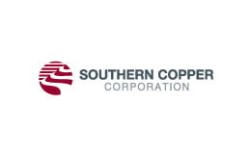 Southern Copper (NYSE:SCCO) is scheduled to be releasing its earnings data before the market opens on Wednesday, July 25th. Analysts expect Southern Copper to post earnings of $0.64 per share for the quarter.
Southern Copper (NYSE:SCCO) is scheduled to be releasing its earnings data before the market opens on Wednesday, July 25th. Analysts expect Southern Copper to post earnings of $0.64 per share for the quarter.
Southern Copper (NYSE:SCCO) last released its earnings results on Wednesday, May 2nd. The basic materials company reported $0.61 earnings per share for the quarter, meeting analysts’ consensus estimates of $0.61. The firm had revenue of $1.84 billion during the quarter, compared to the consensus estimate of $1.84 billion. Southern Copper had a return on equity of 13.90% and a net margin of 12.80%. On average, analysts expect Southern Copper to post $3 EPS for the current fiscal year and $3 EPS for the next fiscal year.
Get Southern Copper alerts:NYSE:SCCO opened at $45.11 on Wednesday. The firm has a market cap of $34.86 billion, a PE ratio of 29.28 and a beta of 0.44. The company has a quick ratio of 1.92, a current ratio of 2.81 and a debt-to-equity ratio of 0.93. Southern Copper has a fifty-two week low of $37.13 and a fifty-two week high of $58.09.
In other news, EVP Quintanilla Daniel Muniz sold 1,600 shares of the business’s stock in a transaction on Tuesday, June 5th. The stock was sold at an average price of $51.20, for a total transaction of $81,920.00. The transaction was disclosed in a legal filing with the Securities & Exchange Commission, which is available at the SEC website. 0.46% of the stock is currently owned by insiders.
A number of research firms have recently weighed in on SCCO. B. Riley downgraded Southern Copper from a “buy” rating to a “neutral” rating and cut their target price for the company from $57.34 to $57.00 in a research report on Thursday, April 19th. JPMorgan Chase & Co. downgraded Southern Copper from a “neutral” rating to an “underweight” rating and set a $45.00 target price for the company. in a research report on Friday, April 13th. ValuEngine raised Southern Copper from a “hold” rating to a “buy” rating in a report on Wednesday, June 6th. Finally, Berenberg Bank reissued a “sell” rating and set a $39.00 price target on shares of Southern Copper in a report on Saturday, June 2nd. Five equities research analysts have rated the stock with a sell rating, seven have given a hold rating and three have issued a buy rating to the company’s stock. The stock currently has an average rating of “Hold” and a consensus price target of $46.06.
About Southern Copper
Southern Copper Corporation engages in mining, exploring, smelting, and refining copper and other minerals in Peru, Mexico, Argentina, Chile, and Ecuador. The company is involved in the mining, milling, and flotation of copper ore to produce copper and molybdenum concentrates; smelting of copper concentrates to produce blister and anode copper; refining of anode copper to produce copper cathodes; production of molybdenum concentrate and sulfuric acid; production of refined silver, gold, and other materials; and mining and processing of zinc and lead.
Read More: Short Selling Stocks, A Beginner��s Guide
 Zacks Investment Research upgraded shares of ALPS Elec Ltd/ADR (OTCMKTS:APELY) from a sell rating to a hold rating in a research report report published on Tuesday.
Zacks Investment Research upgraded shares of ALPS Elec Ltd/ADR (OTCMKTS:APELY) from a sell rating to a hold rating in a research report report published on Tuesday.  Metlife (NYSE:MET) was downgraded by Zacks Investment Research from a “hold” rating to a “sell” rating in a research note issued to investors on Tuesday.
Metlife (NYSE:MET) was downgraded by Zacks Investment Research from a “hold” rating to a “sell” rating in a research note issued to investors on Tuesday. 
